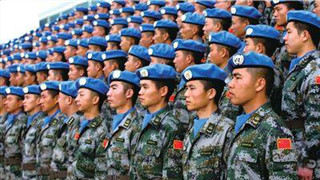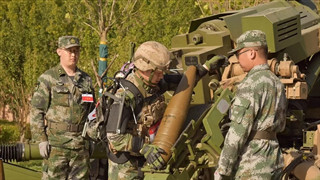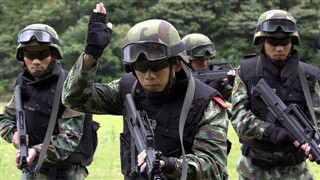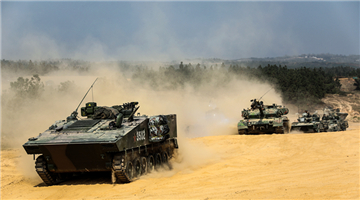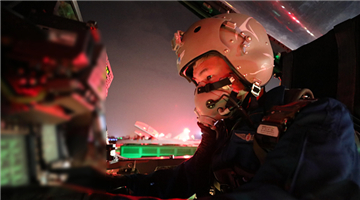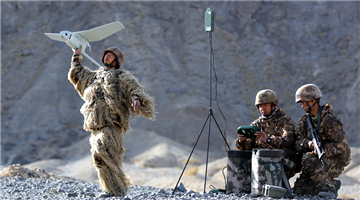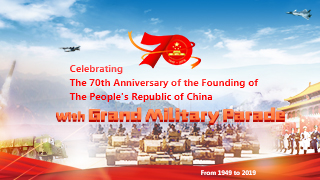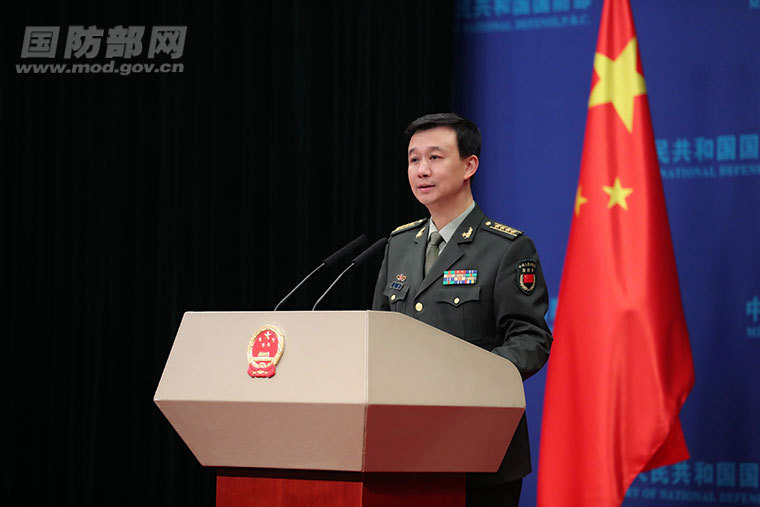
(The following English text of the press conference is for reference. In case of any divergence of interpretation, the Chinese text shall prevail.)
Senior Colonel Wu Qian: Friends from the media, good afternoon! Welcome to this month’s regular press conference of the Ministry of National Defense (MND) of the People’s Republic of China (PRC). Before we start, I’d like to welcome the Hong Kong civil servant class from the China Foreign Affairs University. I have no announcements to make today, now the floor is open for questions.
Question: The 9th Xiangshan Forum wrapped up on October 22. Could you please brief us on the features and highlights of the forum? What are your expectations for the Forum next year?
Answer: The 9th Beijing Xiangshan Forum was successfully held from Oct. 20th to 22nd at the Beijing International Convention Center. President Xi Jinping sent a congratulatory message to the forum, in which he pointed out that peace is the eternal wish of humanity. China remains committed to deepening cooperation through dialogue, promoting peace through cooperation and ensuring development in peace. The message found strong resonance in the public and was well received by the participants. Maintaining lasting peace and stability in the Asia-Pacific is in the interests of all regional countries and calls for collective wisdom and contributions. Safeguarding peace is the shared responsibility of all. It should not be a solo performance but a symphony played by the whole international community.
As for the features of the Forum: first, it highlights the theme of peace with a comprehensive range of topics. Under the theme of “Maintaining International Order and Promoting Peace in the Asia-Pacific”, the Forum focused on the trends of the times of peaceful development and win-win cooperation. Given all the profound changes in the world, the four plenary sessions, eight concurrent sessions and experts’ dicussions covered multiple aspects of the international and regional security situations.
Second, the forum is widely represented with a high level of attendance. It was attended by 76 official delegations and 1300 participants, including 23 defense ministers, 6 chiefs of defense force, representatives of 8 international organizations, and esteemed experts, scholars and observers from different countries. The number of participants and the level of attendance are higher than the previous years.
Third, the forum has forged consensus among different parties with productive results. During the forum, all delegates put their heads together to contribute their wisdom for world peace and reached wide consensus on improving communication and cooperation, and safeguarding peace and stability. The forum has achieved multiple positive results by enabling the delegates to exchange ideas and enhance trust, cooperation, and friendship.
Having been held successfully for nine times, Beijing Xiangshan Forum has developed into a premium global security dialogue. We believe the forum will become more open and inclusive. Just like the ocean that embraces all rivers, it will pool wisdom and solutions of all countries, including the medium and small ones. We believe it will include more substantive and in-depth discussions. Focusing on the current security challenges faced by the international community, the forum will offer more effective solutions. We believe it will become more influential and make greater contributions to peace and stability in the world. As the poem goes “The maple leaves on the Xiangshan Mountain shine even more brightly in heavy frost”. A mountain is high because it is built on heaps of earth. The maple leaves are red because they are tempered in the cold. The woods are colorful because they consist of a rich variety of trees. This is the appeal of the Xiangshan Mountain and the spirit of the Xiangshan Forum.
Question: I have two questions. The first is that the United States sent Deputy Assistant Secretary of Defense Chad Sbragia to attend this year’s Beijing Xiangshan Forum. Chad Sbragia said that the US is committed to adjusting the China-US relations and creating more platforms for exchanges between the two countries so as to better understand each other and carry out crisis communication. He also said that the United States and China should maintain a more sustained and stable relationship, and that the United States is not pursuing decoupling with China. How do you comment on this?
The second question, according to media reports from the ROK, on Oct. 29, a Chinese aircraft entered the Air Defense Identification Zone of the ROK, and the Chinese military had sent flight information to the ROK side through the hotline between the two militaries. This was the first time for the Chinese side to do so. The ROK media said that the Joint Chiefs of Staff of the Republic of Korea (ROK JCS) claimed that the Chinese side actually only responded to the ROK side’s call after the latter wanted to confirm. It is different from early notification. Can you confirm that and do you have any comment?
Answer: On your first question, we welcome Chad Sbragia’s attendance to the Beijing Xiangshan Forum and we welcome his remarks on stabilizing China-US relationship. On developing China-US relations, we should both listen to their words and watch their deeds. We expected solid actions from the US side to develop a sound and stable relationship.
On your second question, a direct military hotline was set up between the two countries' adjacent naval and air force commands. As for the situation you mentioned, the two sides have communicated through the hotline.
Question: I have two questions. During the Beijing Xiangshan Forum, Russian Defense Minister Sergei Shoigu said that the real reason for the US to quit the Intermediate-Range Nuclear Forces Treaty (INF Treaty) is to contain the deterrence from Russia and China. Does the Chinese side agree with Russian Defense Minister? The second question is that the US is planning to deploy new intermediate-range missiles in the Pacific region, to which China has been strongly opposed on many public occasions. Mr. Spokesperson, could you please brief us on China’s position? Thank you.
Answer: Quitting the INF Treaty shows that the US is pursuing a unilateralism policy and shirking international responsibilities, and this can have a direct negative impact on the global strategic balance and stability, regional peace and security, as well as the international arms control and disarmament system. What the US wants by quitting the INF Treaty is to release itself from restrictions and better pursue military superiority unilaterally, to which we are firmly opposed.
On your second question: We are firmly opposed to deploying land-based intermediate-range weapons in the Asian-Pacific region by the US side. Washington’s arbitrary actions are bound to damage the security interests of the regional countries, threatening regional peace and stability, and China will not stand by. We urge relevant country to be responsible for and prudent in its actions and avoid taking wrong moves.
Question: Not long ago, the 7th CISM Military World Games was successfully held in Wuhan. Could you please comment on the highlights and features of the CISM Games?
Answer: The 7th CISM Military World Games was successfully held in Wuhan from October 18 to 27. This is the first time for China to host an international military multi-sport event. It is also the largest games China held after the Beijing Olympics. President Xi Jinping, also General Secretary of the CPC Central Committee and Chairman of the Central Military Commission, attended the opening ceremony, and met with defense and military leaders from 41 countries and the leading officials of the International Military Sports Council.
This year’s CISM Games fully demonstrates the CISM motto of Friendship through Sports. It provides a good opportunity for athletes all over the world to build friendship and learn from each other and writes a new chapter of “Military Glory and World Peace”.
There are three features I’d like to mention. First, it’s the biggest CISM Games ever. Around 10,000 athletes from 109 countries competed in 329 events featuring 27 sports. The number of participants and sports events is higher than the previous CISM games. Second, the competition is intense. This year’s CISM Games has attracted best military athletes of all participating countries. Among them, there are 67 champions of the Olympics, the World Champions, or the World Cups. 118 of them ranked among the top 8 in their sports in the Rio Olympics. During the Games, seven world records and 85 CISM records were broken. Third, the logistics and services of the games were superior. It was the first time for the Games to have a separate athletes’ village, to use high technologies such as 5G and big data throughout the course, and to provide a full range of volunteer services to the delegations of all participating countries.
During the 10-day Games, the athletes pushed their limits and strove for excellence. The game witnessed their excellent performance and growing friendship. The PLA athletes brought back 133 gold medals and 239 medals in total and ranked 1st in both the gold medal table and the overall medal table. They made history by breaking 7 world records and 47 CISM records. On Oct 28, President Xi signed an order to reward the Chinese athletes and coaches that participated in the Games.
The Chinese military will seize the opportunity presented by the CISM Games for new progress in international military cooperation, enhanced military exchanges and deepened practical cooperation with other countries. In this way, we can better fulfill our international obligations, jointly tackle our common security threats and challenges, and make new and greater contributions to world peace and the building of a community of shared future for mankind.
Now, let’s watch a video, “The Torch of Peace, A Legacy of Humanity” for some of the best moments of the CISM Games.
Question: On October 24th, US Vice President Michael Pence said in his speech on the US policy towards China at the Wilson Center that China is the strategic rival of the US and he also criticized China on the issues of the South China Sea and the BRI. Meanwhile, Pence denied that the US is seeking to decouple from China in his speech. Compared with his speech last year, the tone seems to be softer. What’s your comment?
Answer: We are firmly opposed to Vice President Pence’s groundless criticism and slander against China in his speech. The situation in the South China Sea has been improving steadily. And China has made effective efforts for that. In contrast, the US frequently stirs up troubles and flexs muscles in the region to escalate militarization in the South China Sea. It is now plain clear that the US is not willing to see peace and tranquility in the region.
As for the BRI, we have said on many occasions that it is an initiative for economic cooperation and has nothing to do with geopolitics and has no military intention. We urge the US to put away its prejudice and stop making lies.
Maintaining contact between China and US is in the interests of the two countries and a shared expectation of the international community. In the global village, all countries live a community with a shared future. This is an unstoppable trend of the times and human society. Just as Dr. Sun Yat-sen said, “The trend of the times moves on like a mighty river. It is our choice to go along it and prosper, or go against it and perish.”
Question: I have three questions. The first is on the new type of camouflage uniform of the PLA. We noticed that in the military parade celebrating the 70th anniversary of the founding of the People’s Republic of China, besides new weapons and equipment, officers and soldiers were wearing a new type of camouflage uniform. Will the PLA change for the new camouflage and can you confirm that?
My second question is on corruption. Recently the National People’s Congress announced that 6 deputies to the National People’s Congress were asked to resign, including 2 former military generals, one of them is the former Deputy Commander and Chief of Staff of the Strategic Support Force, Lieutenant General Rao Kaixun, and the other is the former Deputy Commander of the Western Theater Army, Major General Xu Xianghua. What is your comment on their violation of discipline and what’s your view on the anti-corruption campaign in the military in recent years?
The third one is about the 70th anniversary of the PLA Air Force. We know that on November 11th next month, the Air Force will celebrate its 70th anniversary. So will the Air Force parade bring us more surprises in addition to those in the military parade? And what’s your view on the change of aircraft types of the Air Force in recent years?
Answer: On your first question: To be in line with the defense and military reform, and meet the requirements of the troops in conducting training and readiness building, based on the type 07 camo, we made efforts to refine the uniform in its color, patterns, fabrics and badges and designed a new type of combat uniform that has been shown in the military parade. The new camo will be allocated to all troops gradually.
On your second question: The related situation has already been reported. I want to stress that the Chinese military will manage itself in strict accordance with law. We will have the perseverance in fighting our battle against corruption and winning this tough battle.
On your third question: November 11th is a special day because it is the birthday of the PLA Air Force. In the past 70 years, the PLA Air Force grew from nothing into a strong force, and it also grew from a single arm force to a multiple-arms force. It developed from territorial air defense to integrating air and space capabilities as well as coordinating offensive and defensive operations, and made great contributions to safeguarding national sovereignty, security and development interests of China and the well-being of the Chinese people. And I suggest you follow official information release on specific celebration activities.
Question: US Coast Guard Commandant Admiral Karl Schultz spoke on October 21st that they plan to increase force deployment in the West Pacific, and the Coast Guard might replace the US navy in conducting the freedom of navigation operations in future. In the next two years, the US Coast Guard plans to homeport 3 fast-response cutters in Guam, and he also said that in the face of coercive and antagonistic behaviors from China, the Coast Guard might be an important part of the US government’s response to that. What’s your comment?
Answer: The Chinese side is firmly opposed to any provocation from the US side, whether it’s from the US Navy or the Coast Guard, and we will take resolute measures to effectively manage it.
Question: On October 1 this year, a grand military parade was held in Tian'anmen Square, which attracted the attention of domestic and foreign media. Would you please comment on the military parade and tell us your personal feelings about the parade?
Answer: The National Day parade this year was the first of its kind after socialism with Chinese characteristics entered a new era, and the debut of the armed forces after their reform and reconstruction. The outstanding performance of the troops demonstrates the firm position of the people’s forces to obey the Party’s command and the great achievements in the building of national defense and the armed forces in the new era. It also demonstrates our resolve and capability to safeguard national sovereignty, security and development interests and our solid commitment to upholding world peace and stability. The parade has inspired the nation with patriotic enthusiasm and great strength. In this grand parade, the ancient Chinese nation and our great motherland, having gone through all the vicissitudes, is again radiant with glory of victory and pride.
On October 1, I had the honor to watch the parade at the Tiananmen Square. Honestly, I was overwhelmed with emotions. As for my feelings, I have three points to make. First, no matter how far we have traveled, we shall never forget the path we once took. From 1949 to 2019, China has gone through a long way to emerge out of backwardness. The achievements we have today come from the sacrifice and devotion of numerous revolutionary martyrs and the hard work of our people. They are true heroes of the nation and we will always remember them. Second, only with strength can a nation stand upright. Peace never came out of nowhere. It needs to be safeguarded with strength. From “two bombs and one satellite” (atomic and hydrogen bombs, man-made satellites) to “Dongfeng Express”, with formidable ground and air troops, gone are the days when the Chinese people were at the mercy of others. Third, just as a song sings, “my motherland and I are like the ocean and the waves”. Without a strong motherland, there will be no happy family. Building a strong country calls for every one’s hard work. The military parade is a review and a demonstration. Moreover, it represents a faith that China and its people, under the strong leadership of the Communist Party of China, can and will surely make greater achievements!
Question: The exhibition entitled “Embracing the World for Peace—Achievements in International Military Cooperation over the 70 Years Since the Founding of the PRC” was very popular in the public when it was staged in the Military Museum of the Chinese People’s Revolution this month. I also visited the exhibition on the spot, and I am deeply impressed by the rich contents and vivid demonstrations. It helps me better understand the international military cooperation of the Chinese Armed Forces. Would you please give us some information about the exhibition?
Answer: Thanks for your recognition of the exhibition. We appreciate all the friends’ care and support for our international military cooperation. As authorized by the Central Military Commission, and in order to celebrate the 70th anniversary of the founding of the People's Republic of China (PRC), the Office for International Military Cooperation hosted the exhibition entitled “Embracing the World for Peace—Achievements in International Military Cooperation over the 70 Years since the founding of the PRC” from September 30 to October 24 in the Military Museum of the Chinese People’s Revolution. During the exhibition, a total of over 300,000 people came to the exhibition. The online exhibition received 4 million visits and the topic “Embracing the World for Peace” on Weibo had over 20 million clicks.
International military cooperation is an important part of the diplomatic work of the Party and the state, and an important component of the building of national defense and military. It has played an important role in promoting the overall diplomacy of China, safeguarding national security and developing the military. The exhibition comprehensively reviewed the beginning, development and achievements of international military cooperation from scratch under the strong leadership of the Party Central Committee and the CMC.
The exhibition has the following four characteristics: First, it systematically reviews a series of President Xi Jinping’s new thoughts, propositions and viewpoints on international military cooperation, and points out the direction for international military cooperation in the new era and provides the fundamental guidance. Second, the exhibition comprehensively shows that under the strong leadership of the Party, international military cooperation has made historic contributions to national independence, people’s liberation, the prosperity of the country and the development of the armed forces in all historical periods, including the periods of revolution, construction, reform and the new era. Third, it mainly demonstrates the efforts by the Chinese armed forces in practicing the new security concept, promoting the building of a community of shared future for mankind, providing more public security goods to the international community and contributing to world peace and stability. Fourth, by presenting pictures, exhibits, models, and using multimedia and online platforms and other forms of demonstration, the exhibition told the stories of the history of China’s international military cooperation in a detailed way, so as to effectively shape the image and spread the voice of the Chinese armed forces.
I visited the museum many times during the exhibition. I’ve seen veterans in their wheelchairs, colleagues with their families, guests from foreign militaries and a lot of lovely kids. The message books are full of their encouraging words for China’s international military cooperation, and their deep love and best wishes to the motherland and the military. You can follow our official account, the "Ministry of National Defense Release", for more articles on China’s international military cooperation. The achievements in international military cooperation are just a part of the glorious journey of our defense and military development and reflect the achievements and glory of the whole country over the past seven decades. We will always remember the history and strive to create a better future. The Chinese military will, as always, continue to embrace the world for peace.
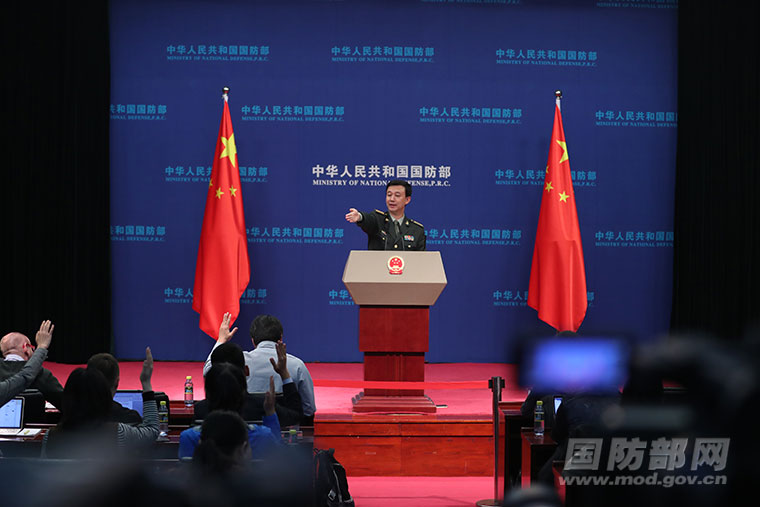
Question: Singaporean media reported that the Chinese Defense Minister and Singaporean Defense Minister signed revised Agreement on Defense Exchanges and Security Cooperation (ADESC) in Beijing on October 20. The Ministry of Defense of Singapore said that it marked a significant improvement of the China-Singapore defense cooperation. So Mr. Spokesman, could you please brief us on the Agreement? Thank you.
Answer: On October 20, Chinese State Councilor and Defense Minister General Wei Fenghe met with Singapore’s Defense Minister Dr. Ng Eng Hen in Beijing and signed the revised Agreement on Defense Exchanges and Security Cooperation Between the Ministry of National Defense of The People’s Republic of China and the Ministry of Defense of the Republic of Singapore. The ADESC states that China and Singapore will conduct cooperation in strategic dialogues, mutual exchange of visits and talks, military education and training, joint exercises and training as well as multilateral exchanges. Those emphasized cooperation includes but not limited to: conducting ministerial-level dialogues and defense policy dialogues on a regular basis, discussing and formulating agreements concerning the status of their military personnel participating in joint training and exercises at the appropriate time, providing logistical support to visiting military naval vessels from the other party, discussing and signing cooperation documents on the mutual provision of logistical support at the appropriate time, opening bilateral hotline, etc.
In 2008, the two defense ministries signed Agreement on Defense Exchanges and Security Cooperation for the first time. Over the past 11 years, the military exchanges and cooperation have been greatly expanded and deepened. The revised ADESC is a reflection of the advancing China-Singapore defense tie and can serve as guidelines for further improvement of cooperation in various fields between the two countries.
Question: I have 3 questions. First, according to media reports, the second aircraft carrier was painted with the hull number recently. Does this mean it will be commissioned soon? Can you confirm that? Second, according to Japanese Kyodo News Agency’s report on October 29, China and Russia are talking about building an alliance between the two countries. The former US house speaker said to Fox News on October 27 that if China builds alliance with Russia, it will pose a very serious security threat to the US and the world. He also said that Russia will help China to fight against the US if China launches attacks against Taiwan. What’s your comment? Third, in early October, Russian President Vladimir Putin said that Moscow is helping Beijing build a missile early-warning and defense system, which is seen as evidence of a China-Russian alliance. Can you confirm that?
Answer: For your first question, China's second aircraft carrier is carrying out various tests as planned and steady progress is being made in the tests. The time for commissioning depends on its construction progress and tests.
For your second question, China pursues an independent foreign policy of peace. The China-Russia comprehensive strategic partnership of coordination in the new era features non-alliance, non-confrontation and is not targeted against any third country. It is an example of the new model of international relations featuring mutual respect, equality, justice and win-win cooperation. It is completely different from the military alliance between some other countries. Taiwan is an inalienable part of China and the Taiwan question brooks no foreign interference. China firmly opposes irresponsible remarks by the US side.
For your third question, in addition to independent research and development of weaponry and equipment, China also pursues active military technological cooperation with friendly countries, which is not targeted at any third party. It is beneficial to regional and global peace and stability.
Question: We notice that the first China-ASEAN Mid-and-junior Level Officers Friendly Exchange activity just concluded. So can you share with us some outcomes of this activity?
Answer: The first China-ASEAN Mid-and-junior Level Officers Friendly Exchange activity was held in China from Oct. 20th to 27th. During the 7-day activity, 43 middle-aged and young officers from China and 9 ASEAN member states had friendly exchanges in Guangzhou, Shenzhen, Foshan and Beijing. They listened to briefings on China’s foreign policy and defence policy, visited PLA troops, went to exhibitions on the achievements of China’s reform and opening-up and visited some of China’s high-tech enterprises. They also had symposiums and discussions. The activity helps promote friendship and understanding between Chinese and ASEAN militaries and provides a new platform for China’s defence cooperation with ASEAN.
This activity is actually one of the initiatives proposed by Gen. Wei Fenghe, State Councillor and Minister of Defense at last year’s China-ASEAN Defence Ministers’ Informal Meeting. It has received active response and strong support from defence authorities of ASEAN member states.
Question: I have two questions. The first one, according to media reports from the ROK, the ROK Deputy Defense Minister Park Jae-min visited China from October 20 to 25 and held the Strategic Defense Dialogue with the Chinese side. This is the first time for the two sides to hold the strategic dialogue up for 5 years. Could you please brief us on the dialogue? The second is that during the US Pacific Fleet Commander’s recent visit to India, he said China has plan to deploy its aircraft carrier to the Indian Ocean and it shows that China has intention to conduct military operations in more areas. What’s your comment?
Answer: On your first question. The Deputy Defense Minister of the ROK Park Jae-min came to China for the Beijing Xiangshan Forum from October 20 to 22. During his visit, State Councilor and Defense Minister, General Wei Fenghe met with him. Lieutenant General Shao Yuanming, the Deputy Chief of Staff of Joint Staff Department of the CMC co-hosted the 5th Strategic Defense Dialogue with Park, and the two leaders exchanged ideas on regional security issues of common interest and the relationship between the two militaries, and they reached some consensus. The Chinese side is willing to conduct exchanges and cooperation with the ROK side on the basis of respecting the security interests of each other.
On the speculation and criticism of some US military leaders against China, I actually would like to give them a mirror as a gift so they can first look upon themselves before criticizing others
Question: I have two questions. The first is that some officials from Taiwan said that the Beijing Xiangshan Forum has become a platform to criticize the US and intimidate Taiwan, and it cannot help improve security in the Asian Pacific but undermine regional peace. What’s your response to that? The second question is that according to media reports, Taiwan plans to purchase 66 F-16V fighters from the United States, and a draft special regulation on purchasing these new fighters has been passed in related departments in Taiwan. According to the plan, Taiwan will obtain 66 F-16V fighters from 2023 to 2026. So what’s your comment? If Taiwan purchased these fighters, what impact it would have on the situation across the strait?
Answer: On your first question, the comment from Taiwan is not consistent with facts. Since its inception in 2006, the Beijing Xiangshan forum has been successfully held 9 times. The Forum has been growing in terms of its size, level, influence and fame. It is now the largest and highest-level track 1.5 security dialogue hosted by China. It has helped countries enhance trust, coordinate policies, promote security dialogue and strengthen cooperation.
Taiwan is an inalienable part of China. Following the 1992 Consensus and safeguarding peaceful development is a guarantee for peace and stability across the Strait. The "Taiwan independence" separatists and their activities are the biggest threat to the peace and stability across the Strait. National reunification is the right course and separatist movement is a dead end. Taiwan should get a clear understanding of its situation, abandon Taiwan “independence” and confrontation, stop its irresponsible remarks and make more contributions to the improvement and development of the relationship across the Strait.
Maintaining peace and stability in the Asian Pacific is in the common interests of regional countries, and calls for the wisdom and strength from all countries. We need more dialogues instead of confrontations, and we need cooperation to achieve harmony. We need more platforms like the Beijing Xiangshan Forum to help regional countries to strengthen mutual trust and reduce misunderstanding and misjudgment.
For your second question, we are firmly opposed to any arms sale by any country to Taiwan. Any attempt of using force to resist reunification is doomed to fail.
Question: According to media reports, Admiral Miao Hua, member of the CMC and chief of the Political Work Department of the CMC, led a delegation to visit the DPRK recently and held meetings with the leaders from the DPRK. This visit was widely covered by the media and some commented that this was an important military exchange between China and the DPRK. Could you please brief us on the visit and the China-DPRK military relationship?
Answer: At the invitation of the DPRK side, Admiral Miao Hua, member of the CMC and chief of the Political Work Department of the CMC, led a delegation to visit the DPRK from October 14-16. During his visit, the delegation met with Lee Soo-young, the Vice Chairman of the DPRK Worker’s Party and the Minister of International Department and Gen. Kim Soo- kil, member of the State Affairs Council and director of the General Political Bureau of Korean People’s Army. The delegation also visited the Palace of the Sun in Kumsusan, the China-DPRK Friendship Tower, Cemetery of the Chinese People’s Volunteers (CPV) in Hoechang and the site of the former Headquarters of the CPV.
In recent years, President Xi Jinping and Chairman Kim Jong-un reached a series of important consensuses on further developing the traditional friendly relations between China and the DPRK, which added new impetus to the development of and opened a new chapter in China-DPRK relations. The Chinese military is willing to work together with the Korean People’s Army to implement the consensuses of the two state leaders and make contributions to the friendly relations between the two countries.
Question: I have three questions. First, some online media reports say that on October 11, a PLA aircraft unit was carrying out a training mission when an accident occurred. The plane crashed, and three people were killed. Please confirm this information.
Second, the PLA delegation ranked first in the gold medal table with 133 gold medals at the just-concluded 7th CISM World Military Games. But at the same time, many media also noticed that the US military delegation ranked 35th in the competition with zero gold medals. How do you look at the gap between the number of medals of China and the United States?
Third, an official from the US Department of Defense said on Oct. 29 that in some high-tech areas, China has been neck and neck with the United States, which will have an impact on the US defense security. Therefore, the US requires restrictions on technology transfer to China. How do you comment on this?
Answer: For the first question. On October 11, an Army aircraft unit in Hunan Province organized night flight training as planned. The pilot-in-command Gong Dachuan, co-pilot Luo Wei and air mechanic Wen Weibin were flying to a certain area of Huaihua City, Hunan Province, when the plane crashed due to a mechanical failure. All of them were killed in the crash. We express our deep condolences to the loss of our comrades-in-arms and sincere sympathies to their families.
It is always painful to hear the loss of our comrade-in-arms. The heroes are gone but the spirit will live on. The People’s Republic of China will never forget the tens of thousands of martyrs who have sacrificed their lives for the interests of the people.
As for the gap between the numbers of medals of the Chinese and the US delegations, I would like to say, “Friendship comes first, and competition second.”
For the third question, China has made some progress in several high-tech areas. But the Chinese side keeps a clear mind when it comes to the extent of its own development. Those people in the US should not downplay themselves, nor over-flatter China. I would also like to emphasize that in the high-tech field, China follows the principle of self-reliance and independent innovation. China’s growth and development cannot be restrained by anyone or any force.
Question: China unveiled DF-17 missiles and DF-41 intercontinental ballistic missiles in the National Day military parade marking the 70th anniversary of the founding of the People’s Republic of China. Could you please introduce the capabilities and strategic significance of the development of the two missiles?
Answer: The capabilities of the two missiles are military secrets so I have no information to share. On their strategic significance, I think these weapons can help China better safeguard its sovereignty, security and development interests and protect global peace, stability and prosperity.
Question: In mid-October, President Xi Jinping visited India for the second informal meeting with Indian Prime Minister. What is your comment on China-India military-to-military relationship? Are there any plan of exchanges and cooperation between the two militaries for the next step?
Answer: Recently, President Xi visited India for the second informal meeting with Indian Prime Minister. The two leaders agreed to bring closer the development partnership between the two countries. It is the right choice that the Chinese dragon and the Indian elephant dance together. Under the guidance of the consensus reached by the two leaders, Chinese military is ready to work with the Indian side to properly manage differences, enhance mutual trust, maintain and enhance exchanges and cooperation in high-level visits, consultation and dialogue, specialized areas, and joint exercises and training and push the relationship towards the right direction of greater mutual trust and friendly cooperation.
